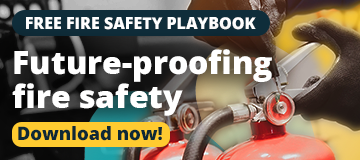
COVID Ventilation Advice for Your Customers
- Keeping Workplaces Safely Ventilated During COVID-19
- Why Ventilation is so Important
- Ventilation Risk Assessments
- Improving Natural Ventilation
- Improving Mechanical Ventilation
As we all start back to work, proper ventilation will be high on an employer’s agenda to reassure their workforce and mitigate any risk from COVID-19. So, what advice should you give? In this blog we take a look at both natural and mechanical ventilation to see what is considered best practice by HSE and BESA.
Keeping Workplaces Safely Ventilated During COVID-19
Good ventilation has always played an important role in improving indoor air quality. Since the arrival of COVID-19, ventilation indoors has become even more critical.
HSE is advising employers to take the following actions to ensure adequate ventilation during the pandemic. They recommend that you and your customers should:
- Understand what good ventilation is and how it prevents virus transmission
- Assess the risk of poor ventilation
- Improve natural ventilation (keep windows and doors open)
- Consider use of a mechanical ventilation system
- Explain to workers why ventilation is important
- Understand what to do in addition to ventilation
As a HVAC software company or maintenance firm, there’s a lot you can do to help support customers while they learn more. Now is a great time to educate customers on ventilation benefits.
Be sure to remind customers to keep up to date with government advice. You can also direct them towards this HSE short video on using ventilation to tackle COVID-19 – it’s a useful reference for companies to help leaders and staff understand why adequate ventilation is so important.
Why Ventilation is so Important
Even prior to the pandemic, poor ventilation in buildings was recognised as being detrimental to health. Indoor air pollution, coupled with bad ventilation, leads to health problems, such as headaches, allergies, asthma, rashes, and sinusitis. Now COVID-19 adds an even more serious layer of threat. By law, employers must ensure enclosed spaces in the workplace are adequately ventilated (this hasn’t changed during the pandemic). But now it’s even more important that employers fully understand the why.
Explain this to customers in simple terms as laid out by the government: “Letting fresh air into indoor spaces can help remove air that contains virus particles and thus prevent the spread of COVID-19. In poorly ventilated rooms the amount of virus in the air can build up, increasing the risk of the virus spreading.”
As employers become more educated on the facts, now could be an appropriate time to discuss upgrades, SMART solutions and the use of CO2 monitors.
Read our previous blog post on the importance of improving ventilation systems post-Lockdown.
Ventilation Risk Assessments
It is vital that ventilation in buildings is regularly checked and that poorly ventilated areas are identified as part of a business’s ventilation risk assessment. Employers must ensure there is an adequate supply of fresh air in all workspaces. This can be from natural or mechanical means.
Encourage employers to draw up a list of the different work areas, how they are ventilated (this should include rest areas and bathrooms), size of each separate workspace, and how many people usually occupy them. It is also important to note the type of work/activity being carried out.
HSE advice includes:
- Identifying areas where there is no natural ventilation (open windows, doors, or vents) or mechanical ventilation (fans or ducts bringing air in from outside)
- Looking out for areas that feel stuffy or smell bad
- Checking if large machinery, equipment, or other features are preventing air from circulating
- Using a CO2 monitor to further identify poor ventilation
Customers should also be reminded not to use desk or ceiling fans in poorly ventilated areas as this would act to spread the virus without removing it.
A basic ventilation risk assessment can be carried out by the employer, but given the COVID landscape, all employers will want to be sure they are getting this right. This is where your professional advice can help them know what to look out for. After all no one understands their ventilation system better than you.
For complex ventilation systems (likely in older buildings), advice should come from one of your ventilation experts, but distilled into laymen’s terms. All mechanical ventilation units should be maintained as normal, but in the current climate, where the spotlight is on ventilation, customers may feel they want a review of their ventilation systems. Offering a survey could be helpful to customers and a proactive sales tactic for maintenance engineers.
Improving Natural Ventilation
Check in with customers to make sure they fully understand the best ways to improve natural ventilation. Remind them they can improve natural ventilation by fully or partly opening windows, air vents and doors.
Educate them on trickle vents, which if present, should be kept open, especially on cooler or windier days when doors and windows may not be opened fully. Ensure occupants understand the purpose and benefits of ventilation grilles, including taking care not to block them.
Improving Mechanical Ventilation
Many workspaces are equipped with air-conditioning or mechanical ventilation systems. Your customers should be fully versed on how to improve mechanical ventilation to maximise fresh air coming into the building, so this is where your expertise is most required.
The advice you give will of course depend on the type of mechanical ventilation in your customer’s building (exhaust, supply, balanced, or heat-recovery). Tailor your advice, but as per government and industry guidance, ensure your customer understands the following:
- How the ventilation system operates
- How to supply all areas with fresh air and how much is required to provide adequate ventilation
- The system must be regularly checked and maintained according to the manufacturer’s instructions
- Mechanical systems will provide adequate ventilation if they are set to maximise fresh air and minimise recirculation (BESA recommends switching air handling units with recirculation to 100% outdoor air)
- If a mechanical ventilation system only recirculates air and has no outdoor air supply, the area is likely to be poorly ventilated
- The ventilation rate may need to be increased or supplemented with natural ventilation
- Operating times of mechanical ventilation systems should be extended (BESA recommends extending operation times for up to 2 hours before and after occupation)
- Air shouldn’t be recirculated from one space to another
- Units for heating and cooling that do not draw in a supply of fresh air can only remain in operation if there is also a supply of outdoor air
- Recirculation units can mask poor ventilation as thermal comfort can feel adequate
Download our Covid-19 Mobile forms and ensure your engineers stay compliant when on-site.
Remember now more than ever your customers will need your advice about both natural and mechanical ventilation. By becoming a trusted expert, you will win both new business from both existing customers for maintenance and new customers for the installation of new systems.
Supporting engineers out in the field has never been so important. Joblogic’s all-in-one field services management system streamlines your business operations, boosts productivity, and improves communications. We offer the best service management system in the HVAC sector. Why not give us a try? Book a demo call or start your FREE trial today.


.png)